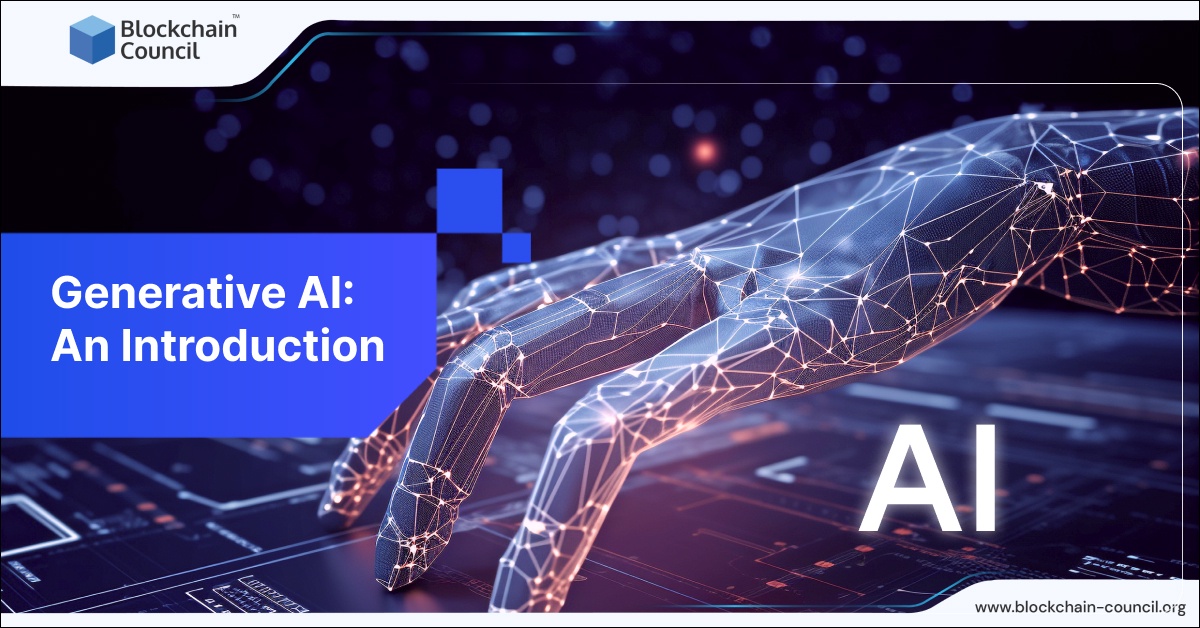In recent years, Generative Artificial Intelligence (AI) has swiftly transcended from a mere industry buzzword to a tangible reality, reshaping various sectors with its innovative capabilities. This article aims to provide a comprehensive overview of Generative AI, shedding light on its evolution, applications, and ethical considerations while offering insights into its promising future.
Tracing the Evolution of AI
To comprehend the essence of Generative AI, it's crucial to traverse through the archives of AI's evolutionary history. The origins of AI can be traced back to the musings of ancient philosophers and mathematicians, who harboured aspirations of mechanizing human reasoning. However, it was in the 19th and 20th centuries that the groundwork for modern AI was meticulously laid, primarily with George Boole's pioneering work in Boolean algebra and Alan Turing's groundbreaking concept of thinking machines.
The pivotal year of 1943 witnessed the advent of neural networks with the introduction of the first artificial neuron by Warren McCullouch and Walter Pitts, marking a significant leap in AI's journey. Subsequently, Alan Turing's seminal paper in 1950, "Computing Machinery and Intelligence," proposed the iconic Turing test as a benchmark for evaluating machine intelligence. The term "artificial intelligence" itself was coined during the Dartmouth Summer Research Project on AI in 1956, signifying the onset of dedicated AI research endeavours.
Despite the initial surge of optimism in the 1960s, fueled by ambitious predictions of achieving human-level intelligence, AI encountered formidable challenges, leading to periods of stagnation termed the "AI winter." It wasn't until the 1990s and 2000s that the resurgence of AI was propelled by the advent of machine learning (ML), which harnessed the power of data to discern patterns directly, thereby enabling a plethora of applications ranging from email spam filters to recommendation systems.
However, the true turning point arrived in 2012 with the emergence of deep learning, a subset of ML empowered by enhanced computational capabilities and advancements in neural network algorithms. This breakthrough heralded a new era of AI research, characterized by unprecedented investments, innovations, and applications. Today, AI permeates various facets of life, with Generative AI emerging as a promising frontier, poised to redefine human-machine interactions.
Understanding Generative AI
Generative AI represents a paradigm shift within the realm of ML, leveraging neural networks to generate novel content across diverse domains such as images, videos, audio, and text. Unlike traditional AI models focused on classification and prediction, Generative AI imbues machines with the ability to create content autonomously, akin to human creativity.
At the core of Generative AI lies the principle of learning intricate patterns from vast datasets, enabling models to produce outputs that exhibit remarkable fidelity to human-crafted content. Whether it's generating lifelike images, composing captivating narratives, or crafting melodious tunes, Generative AI models exemplify the convergence of artistry and technology.
Mechanisms Underlying Generative AI
The mechanism of Generative AI entails an intricate interplay of neural networks, vast datasets, and complex algorithms. Through a process of iterative training, these models learn to discern subtle nuances and correlations within the data, thereby honing their ability to generate authentic-seeming outputs.
While the underlying mechanisms are inherently complex, the overarching principle remains consistent: Generative AI models learn from data to create content that transcends mere mimicry, exhibiting a semblance of creativity and originality.
Dispelling Misconceptions Surrounding Generative AI
Despite the awe-inspiring capabilities of Generative AI, it is often shrouded in misconceptions and misinterpretations.
One prevalent misconception is the notion of self-awareness attributed to Generative AI models. Contrary to popular belief, these models lack consciousness and exhibit no intrinsic understanding of their generated content or the surrounding environment. They operate within the confines of predefined algorithms and training data, devoid of cognitive faculties akin to human consciousness.
Similarly, the notion of unbiasedness attributed to Generative AI models requires scrutiny. These models are trained on vast datasets sourced from the internet, which inherently reflect the biases and idiosyncrasies prevalent within society. Consequently, Generative AI outputs may inadvertently perpetuate and amplify existing biases, necessitating vigilance and proactive measures to mitigate potential disparities.
Furthermore, while Generative AI models exhibit remarkable accuracy in generating content, they are not infallible and may occasionally produce erroneous or misleading outputs. It is important to exercise caution and critical scrutiny when interpreting Generative AI-generated content, corroborating information from reliable sources to ensure veracity and authenticity.
Ethical Considerations in Generative AI
Cybersecurity: Generative AI models pose potential threats by circumventing security measures such as CAPTCHAs and creating sophisticated deep fakes, thereby exacerbating the risks of cyberattacks and misinformation campaigns.
Bias and discrimination: Generative AI models inadvertently perpetuate and amplify societal biases present within their training data. Left unchecked, this phenomenon may engender unfair or discriminatory outcomes, necessitating concerted efforts to mitigate bias and foster inclusivity within AI systems.
Misinformation and fake news: Generative AI exacerbates the proliferation of synthetic media that may be indistinguishable from authentic content. This raises concerns regarding the manipulation of public opinion, electoral integrity, and societal cohesion, necessitating robust strategies to combat misinformation and promote media literacy.
Privacy preservation: Generative AI models potentially infringe upon individuals' privacy rights by leveraging sensitive or personal data to generate content. Striking a balance between innovation and privacy protection is imperative to uphold ethical standards and safeguard individuals' rights in the digital landscape.
Intellectual property right: Generative AI blurs the boundaries of authorship and ownership in content creation. As AI-generated content proliferates across digital platforms, questions regarding attribution, licensing, and fair compensation warrant careful deliberation to ensure equitable outcomes for content creators and stakeholders.
Applications Across Industries
The transformative potential of Generative AI extends across a myriad of industries, catalyzing innovation and redefining established paradigms.
Technology sector: Generative AI facilitates code generation, automated testing, and cybersecurity applications, streamlining software development workflows and bolstering digital resilience against emerging threats.
Finance industry: Generative AI enables automated financial analysis, risk mitigation, and content generation, empowering organizations to make informed decisions and optimize operational efficiencies in a data-rich environment.
Healthcare: Generative AI contributes to medical imaging analysis, drug discovery, and patient care, leveraging predictive analytics and personalized medicine to improve diagnostic accuracy and treatment outcomes.
Entertainment industry: Generative AI revolutionizes content creation, enabling the synthesis of music, movies, and video games with unprecedented realism and creativity while raising ethical considerations regarding attribution and authenticity.
Envisioning the Future of Generative AI
As Generative AI continues to evolve, the future unfolds with tantalizing prospects and unprecedented challenges. Advancements in quality, accessibility, interactivity, and real-time content generation herald a paradigm shift in human-machine interactions, fostering personalized experiences and immersive environments across diverse domains.
The democratization of Generative AI, driven by advancements in hardware and algorithmic sophistication, promises to democratize access to creative tools and empower individuals to unleash their creative potential.
Interactivity emerges as a hallmark of future Generative AI applications, with models adapting to user feedback, preferences, and interactions to deliver personalized experiences tailored to individual needs and preferences.
Moreover, the convergence of Generative AI with emerging technologies such as augmented reality (AR) and virtual reality (VR) unlocks new frontiers in immersive storytelling, gaming, and experiential marketing, blurring the boundaries between the physical and digital realms.
Learn Artificial Intelligence on Blockchain Council!
As the demand for skilled professionals in AI burgeons, individuals aspiring to embark on a career trajectory as an artificial intelligence developer must equip themselves with the requisite expertise and credentials. Pursuing an artificial intelligence certification serves as a pivotal stepping stone towards acquiring specialized knowledge and competencies in this dynamic domain. AI developer certifications not only validate proficiency in cutting-edge AI technologies but also demonstrate a commitment to staying abreast of industry trends and best practices. Moreover, enrolling in prompt engineering courses facilitates hands-on learning experiences and fosters a deeper understanding of the intricate mechanisms underlying Generative AI.
Blockchain Council is an authoritative platform spearheading the advancement of artificial intelligence with its prompt engineer course. As a group of subject experts and enthusiasts, the Blockchain Council is dedicated to evangelizing blockchain research, development, and applications, recognizing the transformative potential of emerging technologies for a better world. Through its prompt engineer certification, the Blockchain Council offers aspiring professionals the opportunity to acquire specialized expertise in generative AI, bridging the gap between theory and practical application in this dynamic field.
Conclusion
In conclusion, Generative AI stands as a testament to humanity's ingenuity and technological prowess, offering a glimpse into a future brimming with possibilities and challenges. While its ascent heralds transformative changes across industries, it is important to navigate ethically and responsibly, mindful of the profound implications and societal ramifications.
By fostering a nuanced understanding of Generative AI's capabilities, limitations, and ethical considerations, we can harness its potential to foster innovation, creativity, and inclusive progress in the digital age. Ultimately, obtaining a generative AI certification from the Blockchain Council empowers individuals to navigate the complex landscape of AI with confidence and competence, thereby unlocking myriad opportunities for professional growth and innovation.


No comments yet